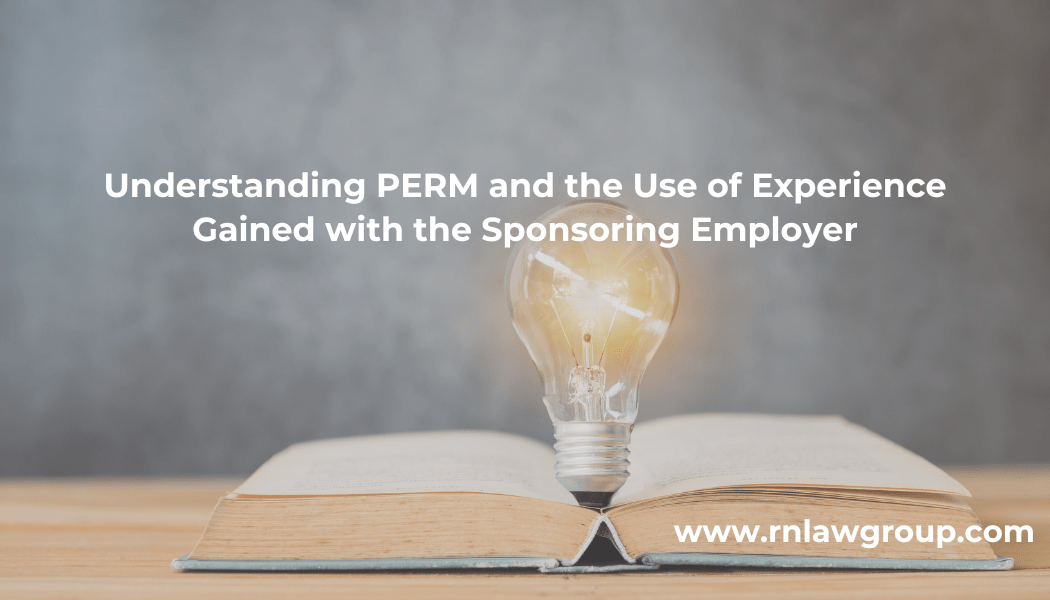
Understanding PERM and the Use of Experience Gained with the Sponsoring Employer
The first step for an employer seeking to sponsor a foreign national for permanent residency in the U.S. is filing a Labor Certification application, also known as PERM (Program Electronic Review Management), with the Department of Labor (DOL). This application demonstrates that no U.S. workers are qualified, willing, able, and available to fill the job position intended for the foreign national (the beneficiary). To establish this, the employer must engage in a good faith effort to recruit U.S. workers.
Establishing the Position’s Minimum Requirements
Before beginning the recruitment process, the employer must determine the actual minimum requirements for the job. These should represent the bare minimum necessary to perform the job effectively—not preferred or ideal qualifications. The beneficiary must meet these minimum education and/or experience requirements before being considered qualified for the position.
Using Experience Gained with the Same Employer
Generally, the DOL does not allow employers to count experience the beneficiary gained while working for the sponsoring employer toward the minimum job requirements. This is to ensure fairness—U.S. workers cannot be held to a higher standard than the foreign worker. If the beneficiary was hired without meeting the current job requirements, the DOL may question whether those requirements are genuinely necessary.
Example:
If the PERM position requires a bachelor’s degree and two years of experience, but the beneficiary was hired by the employer right after graduation with no prior experience, the DOL may view the true minimum requirements as simply a bachelor’s degree—since that’s all the beneficiary had when they were originally hired.
In such a case, the employer cannot require U.S. workers to have more experience than the beneficiary had when hired.
The Exception: Substantially Different Positions
There is a narrow exception to the rule that prohibits using experience gained with the sponsoring employer: the experience may be used if it was gained in a “not substantially comparable” position.
According to DOL regulations, positions are considered “substantially comparable” if they involve performing the same job duties more than 50% of the time. To qualify for the exception, the new PERM position must differ significantly—by at least 50%—in job duties from the prior role.
Demonstrating Substantial Differences
To use prior experience from within the same company, the employer must prove that the two roles involve materially different responsibilities. These differences should be reflected in the job titles, duties, and percentage of time spent on specific tasks.
Example:
A beneficiary works as a Software Developer, spending 100% of their time writing and developing software. They are later promoted to an IT Project Manager role, where over 50% of their time is now spent on management-related tasks, while less than 50% is spent developing software. The employer can likely argue that these two roles are not substantially comparable, and therefore, the beneficiary’s experience as a Software Developer can be counted toward qualifying for the IT Project Manager position.
Even if the two roles fall within the same industry or functional area, what matters most is whether the responsibilities—and time spent on them—are significantly different. An overlap may exist between the two positions, but as long as the overlap remains less than 50% of the job duties, the prior experience may be used to qualify the beneficiary for the IT Project Manager position.
Key Takeaways
- PERM applications must reflect the true minimum requirements for the position.
- Experience gained with the sponsoring employer typically cannot be used unless the new position is not substantially comparable to the prior role.
- To qualify under the exception, the job duties of the two roles must differ by more than 50%.
- Promotions to roles with significantly higher responsibilities—like moving from a technical position to a managerial one—are ideal candidates for this exception.
Each PERM case must be evaluated on its own merits. Because the rules can be complex and fact-specific, employers are strongly encouraged to consult with an experienced immigration attorney before starting the PERM process, especially when relying on experience gained with the same employer. This ensures the application meets DOL standards and avoids unnecessary delays or denials.
For over 25 years, Reddy Neumann Brown PC has focused solely on U.S. employment-based immigration, and works with employers to establish best practices when navigating the PERM labor certification process. If you are in need of a U.S. work visa or permanent residency, speak with one of our immigration lawyers. Please contact us online, call our Houston business immigration office directly at 713-953-7787 or schedule a consultation.
By: Jessica Palarca
Jessica Palarca is an attorney in Reddy Neumann Brown PC’s PERM Labor Certification Department where she assists clients in the beginning stages of the green card process.

